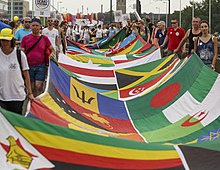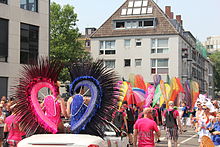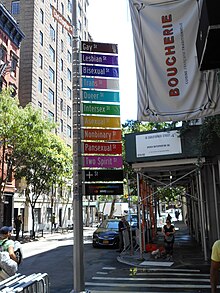Christopher Street Day
The Christopher Street Day ( CSD ) is a party, commemoration and demonstration of lesbians , gays , bisexuals and transgender -People. This day demonstrates for the rights of these groups as well as against discrimination and exclusion . The largest parades on the occasion of the CSD in German-speaking countries take place in Cologne and Berlin .
The name Christopher Street Day is only common in Germany , parts of Austria and Switzerland . In English-speaking and Romance countries, gay pride and pride parades are mostly used .
History of the CSD (Europe)
The CSD commemorates the first known uprising of homosexuals and other sexual minorities against police arbitrariness in New York's Christopher Street in the Greenwich Village district : in the early morning hours of June 28, 1969, the so-called Stonewall uprising took place in the Stonewall Inn bar . At that time there were violent police raids on pubs with trans and homosexual target audiences. African Americans and those of Latin American origin were particularly hard hit by abuse and arbitrariness . When drag queens and transsexual Latinas and blacks in particular fought against the recurring controls that evening , this was the decisive factor for days of street battles with the New York police. The Christopher Street Liberation Day Committee was established to mark the first anniversary of the uprising . Since then, on the last Saturday of June, Christopher Street Liberation Day , New York has been commemorating this event with a street parade. This has become an international tradition of holding a demonstration for gay and lesbian rights in the summer.
The "Frankfurter Allgemeine Zeitung" reports on the first CSD in New York in its issue of November 7, 1970 a. a .: “The parade of thousands of homosexuals that marched up Sixth Avenue from Greenwich Village to Central Park that summer afternoon was planned as a birthday party. [...] A curious parade recently passed through New York with silk banners and defiant posters. […] The mood was exuberant and defiant at the same time. ”The FAZ makes no reference to the police attacks against lesbians and gays in the previous year, which lasted for several days . The reference to a "birthday party" obscures the political character of a tradition that is beginning in the USA, which in Europe will only begin eight years later in Scandinavia.
In 1977 the first "Gay and Lesbian Liberation Day" is said to have taken place in Stockholm with around 400 demonstration participants in Europe. On September 2, 1978, Stockholm's gays and lesbians took to the streets again with the support of the “Reichsbund für Sexuelle Gleichrechte (RFSL)” to celebrate “gay and lesbian liberation day”. The evening before, the Danish film “ Du er ikke allene ” (You are not alone) was shown. Life in a boys' boarding school is described by two 12- or 13-year-old boys. The film is said to have been received with great acclaim. The highlight of the joint meeting was the demonstration (600 participants) on Saturday afternoon in which some punks ("Punks against racism") also took part. Finally, after the demonstration, participants met in the auditorium of a Stockholm high school. Another highlight of the rally is said to have been the appearance of Jörn Svensson (leader of the VPK parliamentary group in the Swedish parliament). He campaigned for the rights and interests of gays and lesbians. His speech was met with sustained applause, supported by two gay singers. Svensson had previously campaigned in the Swedish parliament in March 1978 for the lowering of the age of consent for heterosexuals and gays to 15 years and for an anti-discrimination law. (First reprinted in "Workers' Struggle" No. 138 of September 18, 1978)
The first CSD event in Switzerland took place on June 24, 1978 in Zurich under the name Christopher Street Day . The organizer is Switzerland. Organization of Homophiles (SOH). The approximately one hundred participants in the demonstration demanded "the equalization of the age of consent for girls and boys" and the "abolition of the homo register". The demands for the abolition of the Pink Lists were accompanied by a collection of signatures in Zurich. In Bern, too, gays and lesbians are said to have taken to the streets in support of “snooping and the dismantling of democracy”. The discussion announced in the leaflet with Alexander Ziegler on June 6th is an accompanying cultural event.
In Germany, on June 30, 1979 in Bremen (Schwule Aktion Bremen), Cologne (Schwule Aktion Köln, co-organizer Gay Liberation Front) and Berlin (Homosexuelle Aktion Westberlin) the first CSD events took place under the name "Gay Pride International - Schwuler Karneval" (Bremen) and “Gay Freedom Day” (Cologne). When it came to finding a name, there was still considerable uncertainty among the various gay groups in 1979. The "Rote Fahne" (central organ of the Communist Party of Germany) announced on page 1 in its issue of June 28, 1979 "Gay Freedom Day". In her full-page article she wrote on page 13 in her headline of "Gay Liberation Day". The types of events also varied in 1979. While a cheerful street parade with a demonstration character was carried out from the main train station to the market square in Bremen, an evening event with an info cafe, film screenings and dance events took place in Cologne on the occupied Stollwerck site.
In Bremen, the day's program began with a demonstration train registered by the police at around 11:00 a.m. at the main train station. Theater performances, skits and various music groups were offered on the Bremen market square until late in the afternoon, which were later continued in the Bürgerpark. The evening ended with a dance event in the Schlachthof cultural center . The pink triangle, drawn up on a wooden stick and made in several hundred copies, was distributed. The pink triangle shape was deliberately chosen to also to the persecuted homosexuals in the Nazi era to remember that during her detention in a concentration camp a pink triangle had to wear.
In an interview in Berlin, the contemporary witness and co-organizer Bernd Gaiser ( HAW ) handed down the CSD motto “Make your gay being public” (1979). The Berlin lesbian group had the slogan "Lesbians arise - and the world experiences you". Around 450 participants in the demonstration carried various banners through the streets of the then divided capital from Savignyplatz over Kurfürstendamm to Halensee. As with earlier demonstrations, the focus was on the demand for the abolition of § 175 and the reduction of discrimination. In June 2010, the American philosopher Judith Butler distanced herself from the organizers of the CSD parade in Berlin by publicly refusing to accept the moral courage award. In her speech, Butler lamented the commercialization of the CSD parade, but also the ignorance of racism and double discrimination against homosexual and transsexual migrants .
Also on June 30, 1979, a demonstration took place in Stuttgart with around 400 participants at the Königsbau and at the other Schlossplatz .
The first CSD event in Austria was held on June 26, 1982 with a torchlight parade on Maria-Theresien-Platz. The first demonstration was carried out by performing a "warm Week" (June 17-June 29) as "Gay Pride Day" by the Vienna city center on 29 June 1984. Since 29 June 1996, the CSD is called Rainbow Parade in Vienna held . The privately organized postal system in Austria (since May 1, 1996) issued a special stamp on the occasion of its 15th anniversary in 2010. The design comes from Christian Högl, a long-time board member of the Homosexual Initiative (HOSI). It should be noted critically that with the issue of this stamp, the initial efforts of the lesbian and gay movement with their first CSD events in Vienna in 1982 and 1984 are not taken into account in the calendar.
CSD today
Almost every major city in Germany has a CSD today, the largest in Cologne ( Cologne Pride ) and Berlin, where the " Transgeniale CSD " took place between 1998 and 2013 . The parades and demonstrations during the CSD meanwhile represent similar attractions as, for example, carnival parades or the much newer techno parades . In 2002, as Europride in Cologne, the CSD with 1.2 million participants (participants and spectators) attracted more visitors to the city for the first time than the Rose Monday procession , making it the largest CSD in Europe to date.
The CSD demonstrations in Germany do not take place on the historical date, June 28, but on the weekends from June to August. Planned, registered as a demonstration and carried out, the CSDs are organized by differently structured organizations or individuals on site, often on a voluntary basis and in associations. As a political demonstration, often with a policy-related motto, the CSD usually show themselves in the form of demonstration parades and a subsequent rally. The rally is often supported by artists with performances on stage. In addition to the political message of the CSD, there will be celebrations. This celebration of one's own lifestyle is based on the origins of the CSD: Those involved often show demonstratively that they are proud of themselves, their life and their sexual identity, hence the name Gay Pride . In addition to the CSD parade and the final rallies, there are often one to multi-day street festivals and cultural weeks with well-known artists, political events, lectures, readings and parties in many cities.
Prominent political participants

Some celebrities take part in the CSD, including:
- Federal Foreign Minister and Vice Chancellor Joschka Fischer (Cologne 2002, Hamburg 2004, Cologne 2005)
- Federal Minister Renate Künast (Berlin 2001)
- Governing Mayor of Berlin Klaus Wowereit (since 2001)
- Lord Mayor of Frankfurt am Main Petra Roth (2004)
- Prime Minister of Hesse Roland Koch (Frankfurt am Main)
- Bundestag President Wolfgang Thierse (Berlin 2000)
In some cities politicians also take over the patronage , such as the former First Mayors Ortwin Runde and Ole von Beust in Hamburg , Mayor Helma Orosz in Dresden , Claudia Roth in Würzburg or the former Federal Minister Jürgen Trittin in Braunschweig . In Munich, the demonstration, which is smaller than in other German cities with over a million inhabitants, is now traditionally under the patronage of the mayor.
See also
literature
- Also on the 'Stonwall Fights' in the USA: Los Angeles Research Group (1975). On the materialistic analysis of gay oppression. With a documentation of the standpoints of the Kommunistischer Bund Westdeutschland (KBW) Communist Party Germany / Marxist-Leninists (KPD / ML). Communist League (KB). Gay texts II. Verlag Rosa Winkel (Peter Hedenström). Berlin. 1st edition. April 1977. Pages 50-51.
- Martin Duberman : Stonewall . Plume, New York 1994, ISBN 978-0452272064 .
- Martin J. Gössel: When the first coin flew and the revolution began. The gay movement in the US in the second half of the 20th century. A historical consideration and analysis . With a foreword by Karin M. Schmidtlechner (Institute of Contemporary History, University of Graz). Edition rainbow study series homosexuality. Vol. 3. Rosalia Panthers gay and lesbian working group Styria. Graz. 2009, ISBN 978-3-902080-02-8 .
- Ibo Minssen: More like queer. Portraits from Cologne's Christopher Street Day 1998 to 2009 photographed by Ibo Minssen. With a foreword by Rüdiger Müller and Mario Kramp. Verlag Ralf Liebe, Weilerswist 2010, ISBN 978-3-941037-54-0 .
- Marty Huber: Queering Gay Pride: Between Assimilation and Resistance . Zaglossus, Vienna 2013, ISBN 978-3-902902-06-1 .
Web links
Individual evidence
- ↑ FAZ: 'Aufstand der Homosexuellen' - Complete reprint also in 'Over the Rainbow. A reading book on Christopher Street Day '. MännerschwarmSkript, Hamburg, 2001, page 9. Ed .: Detlef Grumbach.
- ^ AG [Arbeitsgemeinschaft] Schwule im KB (Ed.): 10 years of Stonwall - 10 years of the gay and lesbian movement . 1st edition. Hamburg 1979, p. 62-63 .
- ↑ First published by the 'Swiss Communist Organization POCH' (ed.): Gays demand more rights. Reprinted in 10 [ten] years of gay and lesbian travel. AG [working group] gays in the KB [Communist League] c / o J.Reents Verlag, Hamburg 50 . S. 62 .
- ↑ The beginnings of the Bremen lesbian and gay movement are documented on Jörg Hutter's homepage (accessed December 29, 2019).
- ↑ Mike Schultz: Bernd Gaiser (72). The gay veteran from Christopher Street Day. In: Berliner Zeitung (online edition). July 21, 2017. Retrieved May 12, 2018 .
- ↑ Frauke Hinrichsen: That was the first CSD in Berlin in 1979 (video). In: Berliner Zeitung (online edition). July 22, 2017. Retrieved May 12, 2018 .
- ↑ Mike Schultz: CSD in Berlin: "The fight against homophobia will never end". In: Berliner Zeitung (online edition). July 21, 2017. Retrieved May 12, 2018 .
- ^ Berliner CSD eV: The development of the CSD Berlin. January 1, 2015, accessed May 10, 2018 .
- ^ Simone Klein: Christopher Street Day. From the demo to the party. In: Goethe Institut eV, Internet editorial office. July 2016, accessed July 12, 2018 .
- ↑ Uwe Bogen: Stuttgart album for the CSD anniversary: When the rainbow began to shine . In: StN.de . July 4, 2019. Retrieved on August 12, 2019. (“… none of the 400 demonstrators could have imagined on June 30, 1979. This date marks the beginning of CSD history in Stuttgart. […] It was 40 years ago that the 'Gay Liberation Day' was proclaimed at the Königsbau ... “- With photo series, the first three of them historical photos of the Stuttgart demonstration.)
- ^ Dieter Schmutzer: Homosexuality in Austria on the occasion of the 10th anniversary of the Homosexual Initiative (HOSI) Vienna. In: Michael Handl, Gudrun Hauer, Kurt Krickler, Friedrich Nussbaumer, (ed.): Edition M . 1st edition. Junius Verlags- und Vertriebsgesellschaft mbH, Vienna 1989, ISBN 3-900370-84-2 , p. 213, 215 .







